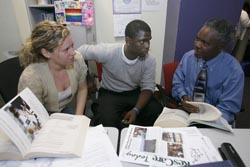Achieving Independence guides kids from foster care into adulthood
 Photo by Ryan S. Brandenberg/Temple University
Amanda Nicliwocki, a senior in Temple University's School of Social Administration and Moses Aima, an MSW candidate in SSA, work together to help Maurice Petty at the Achieving Independence Center.
|
It was like any other graduation; students waiting nervously for what happens next and families and friends sitting in the audience, beaming with pride.
But this graduation ceremony for the Achieving Independence program was different than most. When these students, foster children supervised by the Department of Human Services, gathered in Temple University’s Kiva Auditorium to receive congratulations, encouragement, a new backpack filled with supplies designed to help them through their next step, and in some cases, new laptop computers, they had come through a journey that kids with intact families would never understand. |
|
Just a few years ago, Nija Leek was one of those kids. Before heading off to Trinity College in Washington, D.C., to major in psychology, Leek, 20, had been a foster child looking for a direction. She found it with Achieving Independence, although it was an opportunity that she almost didn’t take. “At first, I didn’t want to go, but my caseworker made me,” she said. “Now, I would recommend it to any foster child. It’s the best thing you can do for yourself.” Temple’s Achieving Independence Center is a place where young people in foster care can get many of the services that they need to make the transition from in-home care to self-sufficiency, said Aubrey C. Powers, the center’s program administrator. Because so many kids were leaving the foster care system unprepared for life on their own, programs and centers such as the Achieving Independence Center were mandated through the John H. Chafee Foster Care Independence Act of 1999, Powers said. “Kids were ‘aging out’ of the foster care system without the necessary skills to be self-sufficient,” Powers said. That lack of preparation lead to kids becoming homeless or finding themselves battling other things such as drug dependency, he added. “Through the center, they get the skills that they need to transition to independent living.” The center, established in 2003, is a partnership between Arbor Care Services, Pathways PA, which handles the mentoring program, and the School of Social Administration’s Center for Social Policy and Community Development, which handles educational services such as GED testing and college preparation. Center members can also receive housing assistance and employment help. Young people who are in foster care or otherwise connected to DHS can begin coming to the center, which is located in the Mellon Center at 701 Market St., at 16 and can continue to come for services until they turn 21, Powers said. In addition to the services provided, the center also runs a cafeteria in the Mellon Center where students can learn food preparation techniques and earn their food service license. Because they don’t have to go to as many places to get the help they need, the center makes negotiating the transition to adulthood a little easier, said Harold Brooks of the Center for Social Policy and Community Development, the center’s education coordinator. “Prior to this center opening, services had to be done at one of our partner locations,” he said. “Here, it’s a one-stop shop. All of the services are being offered in one location.” It’s also a model that is being looked at for others to follow, says Evelyn Busby, executive director of the center. Youth service agencies from New York, Pittsburgh, Washington, D.C., and San Diego have visited the Achieving Independence Center to see if the center’s work can be duplicated in their towns, Busby said. “It’s unique in terms of all of the agencies collaborating,” she said. “It’s also an environment where the kids can be themselves.” As part of the graduation ceremony, members of the Achieving Independence Center who had gone on to colleges including West Chester University, Arcadia and Kutztown University came back to share their experiences and give advice to their peers regarding life beyond the center. The students also received backpacks filled with school supplies and other items, such as toiletries, that they needed to start the school year. For those who were graduating and about to go out on their own, their stories also demonstrated what’s possible when adults truly work together for the sake of the children. |
|